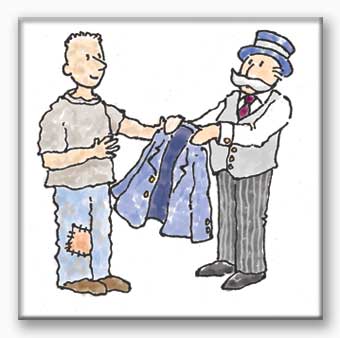After the Wall Street wipeout, in a world full of hurt, we’re still our brothers’ keepers.
With the carnage on Wall Street con- tinuing at a jaw-dropping pace in October and retirees—and folks who aspire one day to be retirees—wondering how devastated stock portfolios will ever recover, a fella could be forgiven for investing a few moments in some serious self-pity. That’s only appropriate after decades of national self-delusion reflected by a “what-me-worry?” approach to deficit spending and deregulation.
A world of hurt is opening up before a lot of working- to middle-class folks in America as Wall Steet portfolios, 401(k)s, home equities, even money market accounts crumble before our disbelieving eyes. We’re all wondering if we’re standing on the precipice of the next Great Depression, and at press time we were a long way from the kind of FDRish “we have nothing to fear but fear itself” leadership that the nation yearns for.
What most of us, so consumed by our own worries now, are ignoring, however, is that a world of hurt has already long been open out there in the on-going crises of hunger, poverty, and violence in the developing world. Father James Hug, S.J. of the Center of Concern, a Catholic economic policy think tank, is properly concerned that market disruptions rippling across the globe may grow into an economic tsunami before finally crashing ashore in the developing world, obliterating decades of progress against poverty and recent successes in regional debt relief.
Even before this market crisis began, food prices had been spiraling out of reach of the poorest in the global economy, propelling hunger and personal insecurity and destabilizing already shaky societies. Violence fueled by competition over export commodities is resurgent in Central Africa, and the world has yet to properly respond to the mayhem in Darfur, which continues its grim march. Meanwhile the overall campaign against global want seems to have lost some steam in recent years and now is fatally threatened by this global economic catastrophe.
The U.N. and World Bank have been urging greater support for the Millennium Development Goals of mitigating poverty’s worst excesses by 2015. That means nearly doubling the foreign aid packages currently being offered by most of the First World economies now wounded by the dominoing failures within their financial sectors.
It’s hard to imagine how, after the inevitable belt tightening that will follow in the coming “market hangover” years, those anti-poverty campaigns will be funded to the level that offers a chance of success. Instead we are likely to see personal charitable donations and government foreign aid end up the first items on the budget cutting block. What will remain perversely, sinfully sacrosanct? Global spending on defense.
That’s a pity, not only because of the personal suffering it will engender, but because the surest and most cost-effective means of securing a just and peaceful future begins with a judicious and equitable distribution of economic resources in the now.
Even in the face of this economic turmoil, in fact because of it, we need to continue to make small investments for peace out of the mercy of our hearts and the wisdom of our foresight. Or we can continue our short-sighted and costly disbursements on defense, anti-investments which only secure future instability, enmity, and misery.
Father hug argues that, ironically, this crisis offers an opportunity to rethink the role of “development” as it’s currently constituted—its relentless focus on opening fragile economies to trade while denigrating the importance of local production, food security, and economic and communal sustainability. Perhaps out of this crisis can emerge a new model of economic solidarity with the world’s vulnerable people.
We are all likely to suffer in the coming months and years as the good ship Capitalism attempts to wrench itself off the treacherous reef it’s struck, but the first to suffer and those likely to suffer the most are the people suffering the most already—the hungry, the poor, the uneducated, the poor in health and spirit, whether in Chicago or Nairobi or Jakarta.
We in the First World who will be tempted to put them at the bottom of our priority lists as we sort out this mess do so at their peril—and ours.














Add comment